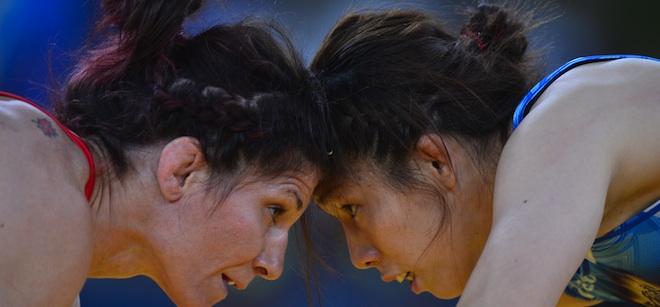Tonya Verbeek’s silver lining
Canada’s best women’s wrestler is content to have tried her best, even if she came up short
Canada’s Tonya Lynn Verbeek (L) wrestles Japan’s Saori Yoshida in their Women’s 55kg Freestyle gold medal match on August 9, 2012 during the wrestling event of the London 2012 Olympic Games. AFP PHOTO / YURI CORTEZ (Photo credit should read YURI CORTEZ/AFP/GettyImages)
Share
Tonya Verbeek believed, and so did her coaches. That at London 2012, the time was ripe for David to take down Goliath. That Canada’s best women’s wrestler—and arguably the second best 55kg grappler on the planet—finally had a chance to reach the top step of the podium. All it would take was a victory over Japan’s Saori Yoshida. And that was where the plan came apart.
Squaring off against the two-time defending Olympic champion in the gold medal match, the Beamsville, Ontario native again came up agonizingly short, losing 3-0, and collecting the silver medal. It was the same outcome as their match-up in Athens in 2004. And also a replay of their clash in the semi-finals of the tournament in Beijing in 2008, that relegated her to the bronze.
“I thought that this was the day I could make it happen,” said Verbeek. “I felt strong. I felt like I gave my everything. And I’m happy to bring home a silver for Canada.”
For the type of fans who tune into her sport every four years expecting the best, it might come as a disappointment. But the reality is that beating Yoshida is one tall order. The 29-year-old has lost precisely twice in her 10-year career. Once in 2008, and this past May. And over that span she has collected nine straight world championships to go along with what are now three Olympic golds.
But a close match for the gold at last year’s worlds had given Verbeek’s camp hope that she might be getting close to toppling the best-ever. “We were here to win. We were here to win,” said Marty Calder, her coach. For where there is life, there is hope. “I didn’t think the Giants were going to win the Superbowl this year, or the LA Kings (the Stanley Cup.) We’re competitors.”
And although it was Verbeek’s final Games, there were no tears or self-doubts like there were in the aftermath of her first Olympic loss. “I’m eight years older and I’ve been through a lot of ups and downs in my career,” she explained. “Ultimately, I think you have to be happy with what you’ve done, and I promised myself that going into these Olympics.”
So with 12 friends and family cheering her on, she mounted the podium and smiled. Content to have tried her best, even if she came up short.
Now Verbeek is thinking about the next phase of her life. Already a substitute teacher, she may look for a permanent position, and would like to start a family. She plans to stay involved in wrestling via coaching. “I love wrestling,” said the soon to be 35-year-old. “It’s given me so much. That work ethic, and learning how to deal with losses and accept them and move forward, and a sense of gratitude for all the people who are on my side and support me. It’s given me confidence.”
Calder said his charge will be remembered as one of the wrestling’s greatest and most consistent performers, with three world championship podiums to go along with her two Olympic silvers and the bronze. An accomplishment in sport where the tournament takes place over just one day, and there is absolutely no room for error. “She’s a goer. She fights to the end,” he said. “Sometimes you lose to people who maybe, maybe are better than you. And you have to accept that, I guess.”
And when it comes to the Olympics, second best is pretty damn good.
